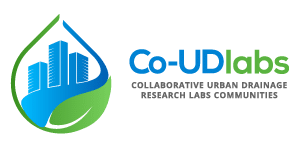Webinar: Towards Fair Data Sharing in Urban Drainage
A joint activity of the Co-UDlabs project and the IWA International Working Group of Data and Models
Summary by Jörg Rieckermann, Eawag
On the 28th of January 2025 we held an online workshop to discuss FAIR monitoring data practices in urban drainage with the community, which are currently lacking. The event brought together researchers and industry representatives.
In a high-level introductory talk, Henrik Dissing highlighted how the Water4all partnership promotes innovation in water data management and stressed that data-sharing leadership must extend beyond purely technical staff. He cited Denmark’s Environmental Portal— an aggregator of diverse Danish environmental data—as proof that centralized, harmonized data drives cross-sector collaboration. Dissing emphasized the importance of creating value from the data, which often requires to think about services that the data could be used for. He called for similar national-level aggregators and stressed the importance to think about a unified water data ecosystem spanning both technical infrastructure (like sewers) and natural environments (like receiving waters). Details are outlined in the Water4all white paper.
Alfredo Chavarría from Eawag, summarized the results from the Co-UDLabs project on data harmonization and sharing. On the one hand, this concerns the co-udlab consortium’s diverse data from the unique research infrastructures and real-world Water-Oriented Living Labs (WOLL). He highlighted OGC standards (Observations and Measurements, WaterML, SensorThings API) as robust frameworks for sharing hydrological and urban drainage data. He also called for expanding the Dutch GWSW ontology,—currently more focused on sharing wastewater infrastructure data —to include more elements on monitoring data. For the GWSW, he developed an English translation, which could be a starting point for an internationally recognized ontology. As a role model for a domain-specific FAIR data repository, he mentioned the Materials Cloud platform, where curated datasets are made openly available next to models provided by the community and the required tutorials.
The open discussion focused on key bottlenecks to build scalable, interoperable data systems amid fragmented administrations (e.g., Germany’s varying municipal software). Key challenges include convincing decision-makers (municipalities, utilities, regulators) to invest in unified platforms, and think about services that could be developed from openly available data. Some participants saw industry as a main driver for the development and implementation of open standards (e.g., SensorThings API), mainly in the context to provide specific services. Nevertheless, scientists and especially, public funding, can play a leading role in developing demonstrators.
Proposed actions involve forming a data-standard interest group, with the task to review ontologies like GWSW (available in English from Co-UDLabs) and possibly showcasing a FAIR data pilot, such as a standardized flood data archive, at the 2025 Urban Drainage Modeling Conference.
If you are interested to join, please contact Alfredo Chavarria.
